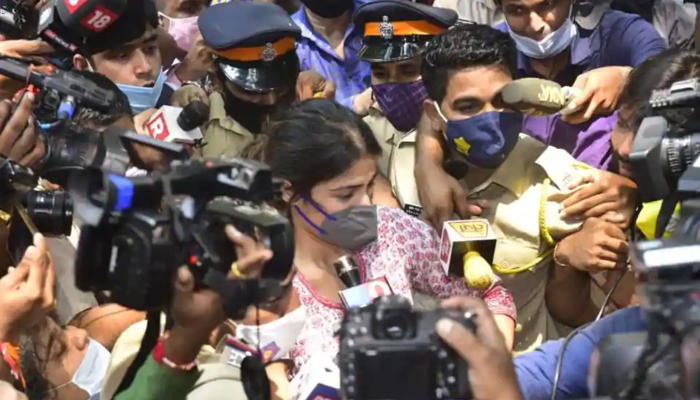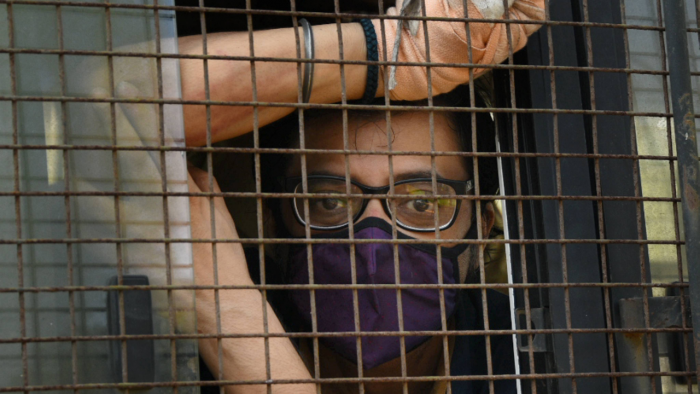Arnab Goswami arrest no attack on press freedom
Moments after a team of Raigad police officials raided residence of Arnab Goswami, managing director of Republic Media Network, on Wednesday and arrested him on charges of abetment to suicide a strong and sharp response came from the ruling BJP and several union ministers slamming the Maharashtra government and notably the Congress Party for stamping out press freedom and that the arrest was reminiscent of the ‘dark days of Emergency’.
Several seniormost leaders of the party including Union ministers Amit Shah, Smriti Irani and Prakash Javadekar as well as chief minister of Uttar Pradesh Yogi Adityanath expressed their outrage at the arrest. The BJP leaders accused the Maharashtra government of abusing its power and clamping down on freedom of expression.
However, the BJP leaders seemed to be oblivious to the fact that Goswami was not arrested for any of editorial work or his extremely controversial statement or even his frequent outbursts that more often than not would be classified as hate speech. He was arrested because he allegedly abetted suicide of Anvay Naik, an architect who had designed Republic TV’s studios and reportedly had not been paid his dues.
Yet, the BJP leaders seemed to compete with each other in defending Goswami and attacking the Congress and the Maharashtra government for the arrest. The irony of these statements was entirely lost on the BJP leaders themselves. The ruling party, at the federal level and in practically all the states ruled by it, has spent the past six years suppressing media freedom as has never been seen in India, save the Emergency that lasted 21 months in the 1970s.
The best example of BJP’s double speak on the issue of media freedom was Adityanath. “The arrest of senior journalist Arnab Goswami is an attack on freedom of expression by the Congress party. The party which imposed emergency on the country, and which has always shied away from facing the truth is trying to strangle democracy again. This act of the Congress-backed Maharashtra government is a scandalous attempt to stop the fourth pillar of democracy, the media, from acting independently,” Adityanath tweeted on the arrest.
When journalists are arrested for doing their job
Incidentally, Adityanath enjoys the worst record of curbing press freedom in the country. Ever since he took charge of the most populous state in the country three years ago, dozens of journalists have been arrested by UP police under the most draconian acts including terror act UAPA for either simply tweeting something related to the developments in the state or for their reports criticising Adityanath or his policies.
Just last month, in the case of an alleged rape and murder of a Dalit girl in Hathras, the UP police had barricaded the village where the victim lived and tried to stop the media from entering the village and talking to her family. Around the same time, Siddique Kappan, a reporter with a Malayalam news portal was arrested by the Uttar Pradesh police on October 5 while on his way to Hathras to cover the case. He has been charged under the Unlawful Activities (Prevention) Act for ‘conspiring’ against the state government.
In August, another journalist Prashant Kanojia was arrested for a tweet which he had later deleted. It was on October 21 that Kanojia could manage to get bail in the case where he was charged under nine different sections of the Indian Penal Code and where he faced a combined punishment of 28 years. Referring to the authorities in Uttar Pradesh, Kanojia’s wife, Jagisha Arora, told RSF, an international media freedom body that, “The tweet was an excuse. He was their target. They were waiting to frame him in some way or another. He has been a fearless critic of the government and a voice to the marginalised communities, including the Muslims and Dalits.”
In Gujarat, editor of a Gujarati news portal, Dhaval Patel, was charged with sedition after he published a report that suggested the state chief minister could be changed by the ruling Bharatiya Janata Party due to rising number of coronavirus cases in the state.
These are just a few such cases. Dozens of other journalists have been targeted by the ruling party just in 2020 for their coverage of the pandemic in the country. Veteran journalist Vinod Dua was charged with sedition by Himachal Pradesh police. Similarly, in Jammu and Kashmir, FIR was filed against Kashmiri photojournalist Masrat Zahra under the Unlawful Activities (Prevention) Act (UAPA). The same act was used to charge senior Kashmir journalist Gowhar Geelani.
According a report prepared by New Delhi-based Human Rights Law Network (HRLN), in the span of just over three and a half months, since the lockdown had been announced by the government on March 25, a total of 66 serious incidents took place where journalists covering the pandemic have been attacked or threatened by the police. And the cases were not limited to any particular city or state. Indeed, the report cites examples from all over the country.
But perhaps the most startling case of suppression of free press and freedom of expression has been seen in Jammu and Kashmir for well over a year, right from August 5, 2019 when the federal government clamped down a curfew, cut off mobile and fixed telephones and literally locked down media offices in a bid to keep control over dissemination of news and information in the state.
Since then there have been several incidents of journalists and their offices being raided for writing reports critical of the government or for refusing to toe the official line on how every resident of the troubled region is firmly behind the central government and its highly controversial moves over the past 15 months. Just last month, officials in the state evicted journalists from the office of the English-language Kashmir Times newspaper in Srinagar and then sealed the premises.
It is under the BJP government that India has consistently dropped on the RSF’s World Press Freedom Index and on the 2020 ranking, India stood a pathetic 142nd out of 180 nations.

Arnab Goswami and Republic TV had mounted a witch-hunting campaign against actress Rhea Chakraborty in the Sushant Singh Rajput suicide case
When hunter is hunted
Abetment to suicide is a serious cognisable offence under the Indian Penal Code and is not bailable, meaning the police is obliged to produce the accused in the court which alone can decide on bail.
However, it also means that the police need to have a fairly strong case before they can move to arrest a person. In Goswami’s case, the police have reportedly banked on the suicide note left behind by the architect as well as the numerous statements made by his family members against Goswami and Republic Media.
Ironically, not too long ago, it was Arnab Goswami who had led a month-long witch hunting campaign against Bollywood actress and Sushant Singh Rajput’s girlfriend Rhea Chakraborty calling for her arrest in Rajput’s suicide case. Without a shred of evidence, Goswami ranted day and night on his channel and accused her of being the reason behind Rajput’s death. The same Goswami gloated for days when Chakraborty was arrested by the Narcotics Control Bureau on the flimsy charge of supplying drugs to Rajput.
Such was the witch hunting by Republic TV and Goswami in the case that even Supreme Court thought it was unfortunate. The Bombay High Court had questioned the channel’s coverage of Sushant Singh Rajput’s suicide and said, “There are certain Suicide Reporting guidelines. There should be no sensational headlines. Don’t you have respect for the dead? It is so unfortunate.” It further added, “When a case is under investigation and the issue is whether it’s a homicide or a suicide and a channel is saying it is murder, is that investigative journalism?”
Fate seems to have delivered justice now when Goswami himself is in the net for a case that prima facie has much more meat than the Rhea Chakraborty witch hunting.










